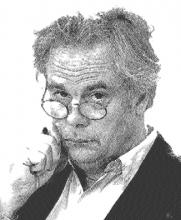You are here
A first in Africa
May 04,2017 - Last updated at May 04,2017
Last May, a court in Senegal convicted Hissene Habre, the former ruler of Chad, and sentenced him to life imprisonment for torture and crimes against humanity.
On Thursday last, an appeals court upheld the sentence and now Habre, who ran from Chad after a coup in a military transport that airlifted him, his entourage and a Mercedes to what he hoped would be a luxurious exile in Senegal, is languishing in an ordinary prison cell.
Habre’s government killed more than 40,000 people during his presidency from 1982 to 1990, when he was deposed.
The American government made a last minute effort to save Habre, but failed. He had long been an important, if secret, ally. He was, according to Michael Bronner, writing in the respected Foreign Policy magazine in January 2014, “the centrepiece of the Reagan administration’s attempt to undermine Muammar Qadhafi who had become an increasing threat and embarrassment to the US with his support of international terrorism”.
Senegal became the first country in the world to ratify the treaty establishing the International Criminal Court (ICC).
According to Hugh Brody, the head of the New York-based Human Rights Watch, Senegal “is a country that always considered itself to be in the avant-garde of international law and human rights”.
Nevertheless, it gave Habre refuge for years, before finally succumbing to pressure from human rights organisations, Belgium and the African Union to put him on trial.
One of the people who staggered to freedom from his jail in Chad, the moment of the release of all Habre’s political prisoners, was Souleymane Guengueng. He was a former accountant, nearly blind and barely alive. In 2013 he would prove to be Habre’s undoing.
Brody sent a student law team to Senegal to interview him.
While in prison, Guengueng had compiled 792 witness accounts that he had coaxed out of fellow prisoners.
The students hid copies of the documents in the laundry room of the monastery in which they were staying. One of them took the risk of an airport search by putting them in his bag and taking a plane home.
The next step, in January 2000, was for Brody and his colleagues to file a case against Habre.
Brody says: “When we began we didn’t know who was who — who would give information back to Habre. We were really afraid he would try to escape from Senegal.”
Fortunately, they had Guengueng’s documents, which were the documentary core of the case.
They filed the case on January 26. Two days later, the senior investigating judge summoned the Chadians to tell their stories. The case made headlines across Africa. Four days later, the judge indicted Habre and placed him under house arrest. The New York Times editorialised: “An African Pinochet… a welcome new chapter in the evolution of international law.”
But the drama still had many acts to go. On July 4, the judge was removed from the case. The following year the country’s top court ruled that Senegal did not have jurisdiction over crimes committed by Habre in another country.
Then, Brody helped Chadian victims who had been given refuge in Belgium to file a criminal complaint under the country’s law of universal jurisdiction.
In 2009, after Senegal had repeatedly failed to respond to an extradition request, Belgium took the case to the World Court, the International Court of Justice.
In March 2012, the court convened. Days later, Senegal elected a new president, Macky Sall. He announced that Habre would be tried in Senegal.
Senegal’s minister of justice, Aminata Toure, told Bronner: “We have to walk the talk.”
On July 20, the World Court issued its unanimous decision, ordering Senegal to “without further delay submit the case to its competent authorities for the purpose of prosecution”.
On June 30, 2013, the police arrested Habre at his home where he had lived in gilded exile for 22 years.
The Obama administration welcomed the trial. It began in the summer of 2015 and finished in May last year.
It was the first time that a former African head of state has been prosecuted for human rights abuses in an African country other than his own (and where until recently he had enjoyed the hospitality and protection of his hosts).
The conviction is also significant, as it required the intervention of courts across several jurisdictions.
It also required the African Union, with its 54 member states, to mandate Senegal’s prosecution and judges to proceed with the case.
It has allowed the African Union to reclaim some of the moral high ground it had lost during its campaign threatening to withdraw from the ICC because of its alleged bias against Africa.
It points the way to reconciling the conflicting demands of international law, regional politics and national sovereignty.
Other parts of the world could emulate it with their own human rights criminals.













